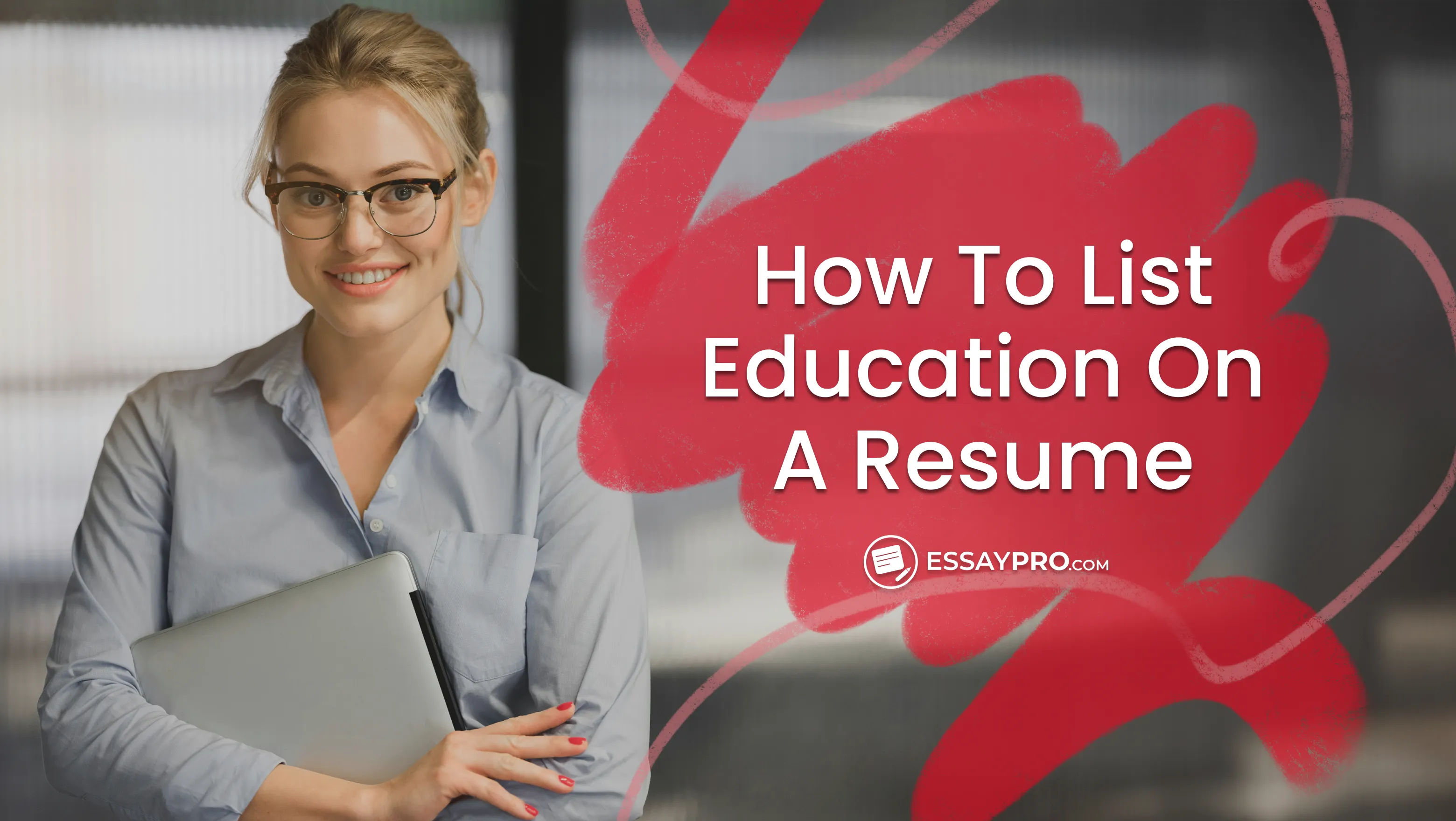Your education section shows what you’ve studied, how far you’ve come, and what you’re ready to take on next.
Here’s what to include:
- The degree or program you're in
- Your school’s name
- Graduation year (or expected one)
- What you majored in
- Extras like GPA, honors, coursework, or leadership (if applicable)
This guide breaks down everything you need to know to put your education on a resume with clear steps and real examples. Whether you're still in school or already finished, you'll know exactly how to show it.
If you need someone to look over your draft or help with assignments, try EssayPro’s essay helper online service for academic support when you need it most.
What to Include Under Education on a Resume
The education section of your resume gives potential employers an idea about your academic background. Even if school feels like it was a long time ago, how you present your education still matters. This part of your resume should be clear and relevant to the job you're applying for. Here's what you should include:
- School name
- Degree or program title
- Major or concentration
- Graduation year (or when you expect to finish)
- GPA (3.5 or higher)
- Honors (Dean’s List, cum laude, etc.)
- Relevant courses, projects, or clubs if they connect to the job
Reading Faulkner this semester? Here's a quick A Rose for Emily summary to make your next quiz a little easier.
Where Does Education Go on a Resume
Education goes in a separate section in your resume, apart from the work experience and skills. The placement of the resume education section depends on your history: if school has been your main focus, it should go at the top. If you’ve got more work experience, education usually fits better after you list your professional history.
- Still in school or recently graduated: Put your education right at the top. If you don’t have much work history yet, your degree, GPA, or coursework is what employers want to see first.
- The job requires a certain degree/certification: Start with your education. If the role calls for a specific qualification, make it easy to find.
- Already advanced in your career: Move education lower on the page. Your recent roles, skills, and accomplishments will matter more than where you went to school years ago.


How to List Your Education on a Resume
In this section, you'll learn how to build a clean, useful resume education section that hiring managers can scan in seconds and still get the full picture.
Before we start, check out our admission essay writing service if you’re applying to college or grad school.
Start With Your Most Recent School
Always list your schools in reverse chronological order and begin with the most current school you’ve attended. This helps employers quickly see your latest academic experience. Include the full name of the school, the exact degree or program, and the expected or completed graduation date.
Example:
University of Pennsylvania - B.A in Sociology, Expected May 2026
Add Your Major (And Minor, If Needed)
Your major reveals the main direction of your studies, which shows potential employers how your background fits the job. You can also add your minor if it adds context: say, it balances a technical major with communication skills. The format must be very specific so everything is easy to follow at a glance.
Example:
Major: Psychology | Minor: Communications
Add Your GPA (Only If It’s Strong)
A strong GPA proves that you worked hard throughout your program. If you recently finished school and earned a 3.5 or higher, it’s worth adding. But if you’ve been in the workforce for a while, it’s okay to leave it out. Only include it when it clearly strengthens your qualifications.
Example:
GPA: 3.7
Add Coursework Or Projects
Classes and school projects can help you fill the gaps if you haven’t managed to get much job experience. Only choose coursework or assignments that show what you’ve learned and, more importantly, how you’ve applied it. Projects that involve real tools and research translate well outside the classroom, so they can give your resume more depth.
Example:
Capstone project: Designed and tested a prototype fitness tracker app
List Honors, Awards, Or Scholarships
Recognition says a lot about your time in school. Any scholarship or academic award is worth sharing. It shows that your effort didn’t go unnoticed and that you brought something extra to your program instead of just getting through it. Including these details can help hiring managers see that you made the most of the opportunities you had.
Example:
Dean’s List (4 semesters) | Academic Excellence Scholarship
List Certifications
Certifications can help fill in the gaps your degree might not cover. They show that you’ve taken the initiative to learn something specific, something that wasn’t just handed to you as part of a standard program. If the certification connects directly to the work you want to do, it becomes even more valuable.
Example:
Google UX Design Professional Certificate
Read Also: How To List Relevant Coursework On Resume.
Education on Resume Examples
1. Examples for Recent Graduate
Just finished school? Here’s how to highlight the work you’ve already done, even if it’s not job-related yet.
Example 1: Strong GPA and Academic Honors
You want to show consistent performance and dedication in your field. This works well when your grades and awards back you up.
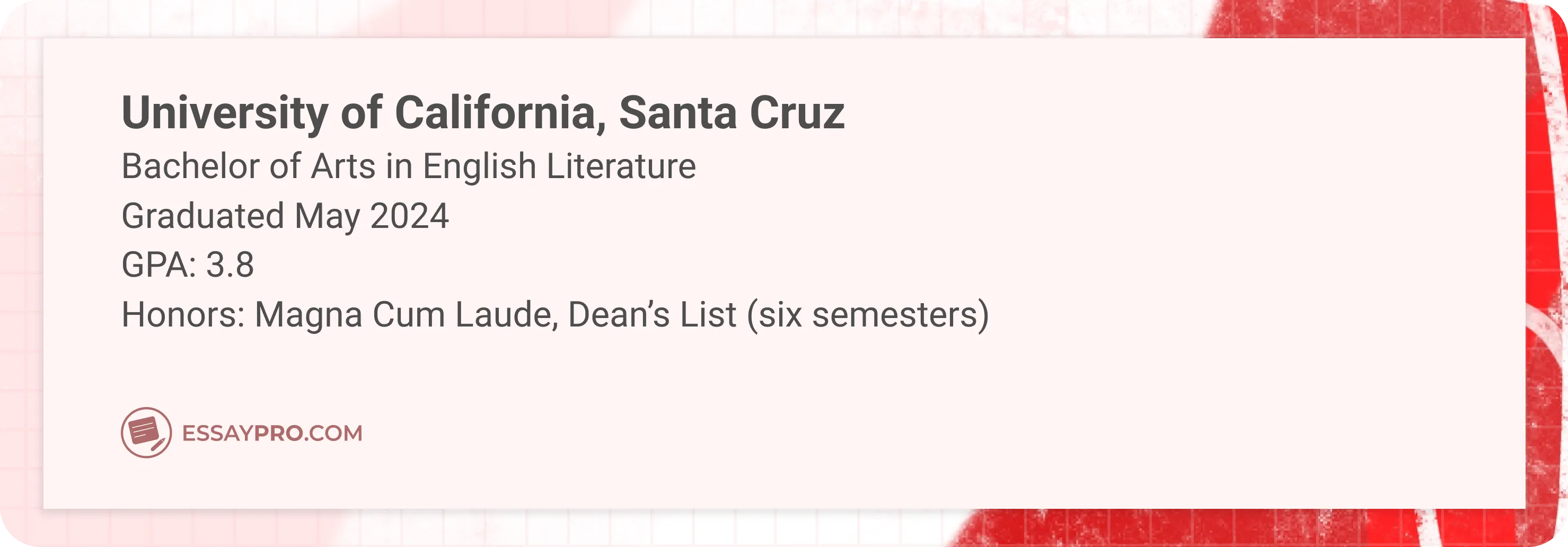
Example 2: Bachelor’s Degree With Relevant Projects & Leadership
What to include: Hands-on work or leadership roles that connect to your field.
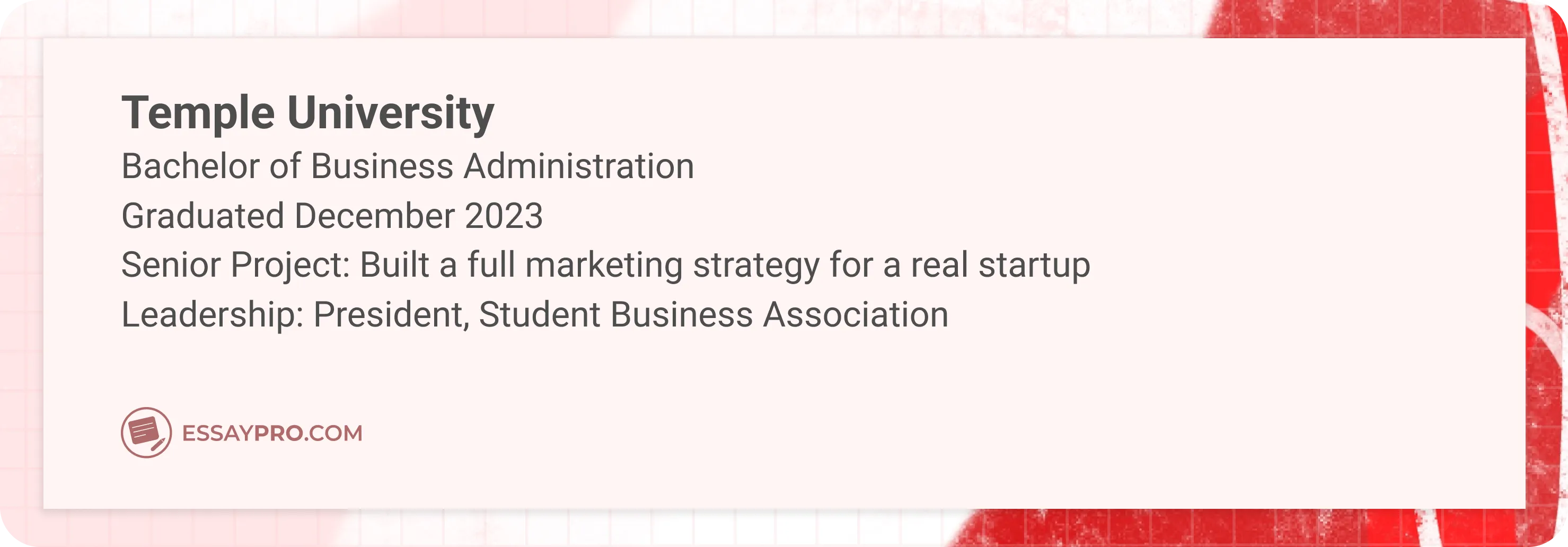
Example 3: Bachelor’s Degree With Minor and Study Abroad Experience
What to include: Your major, minor, and any global experience.
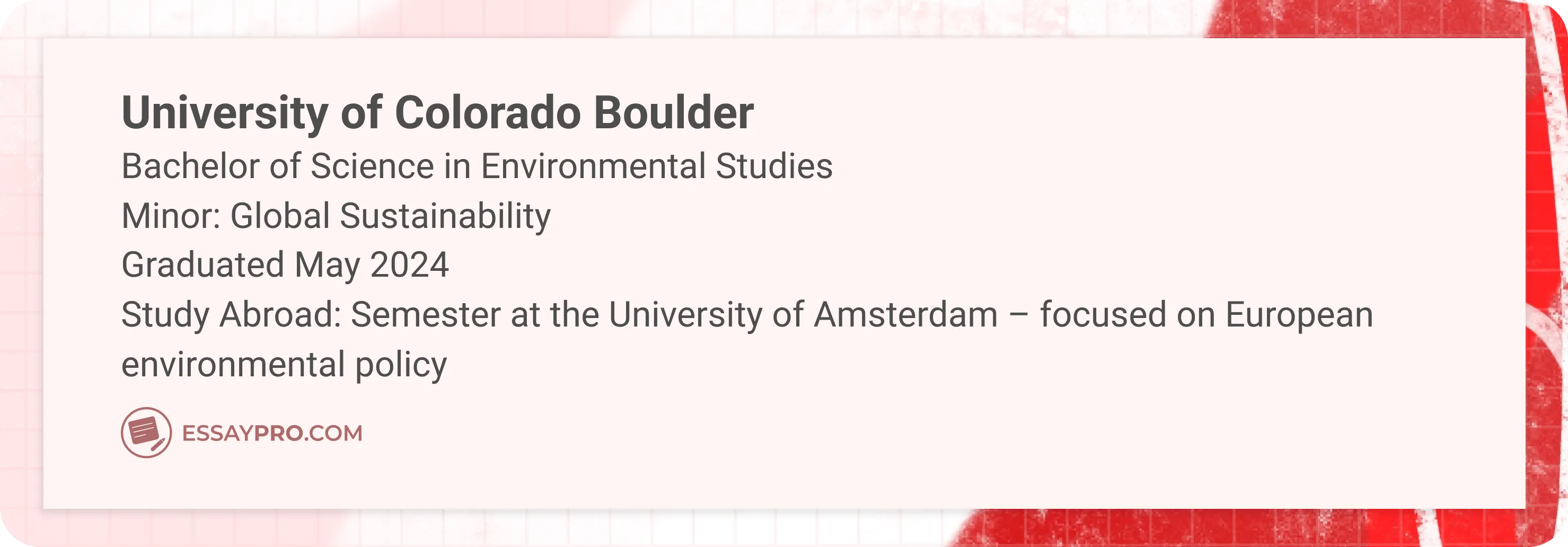
If you’re working on application materials that require specific writing, here’s a guide on how to write an illustrative essay that will help you practice.
2. Examples for Current Student
If you’re still in school, that’s not a drawback. You just need to frame where you are now and what you’re working toward.
Example 1: Undergraduate Student (Degree in Progress)
You haven’t graduated yet, but you can still show what you’re studying, where you’re headed, and when you expect to finish.

Example 2: Graduate Student with Previous Degree
If you’ve already completed one degree and are now pursuing another, mention both. List your current program first, then briefly below, your past degree.
.webp)
Balancing school and job apps can be a lot. If you're stuck, you can always buy an essay written to your exact instructions.
3. Examples for High School Student
If you’re in high school, your resume should include your coursework, clubs, volunteering, etc. You don’t need job experience to have a strong education section.
Example 1: High School Diploma With Activities
Show your diploma, when you’re graduating, and any achievements demonstrating leadership or commitment.
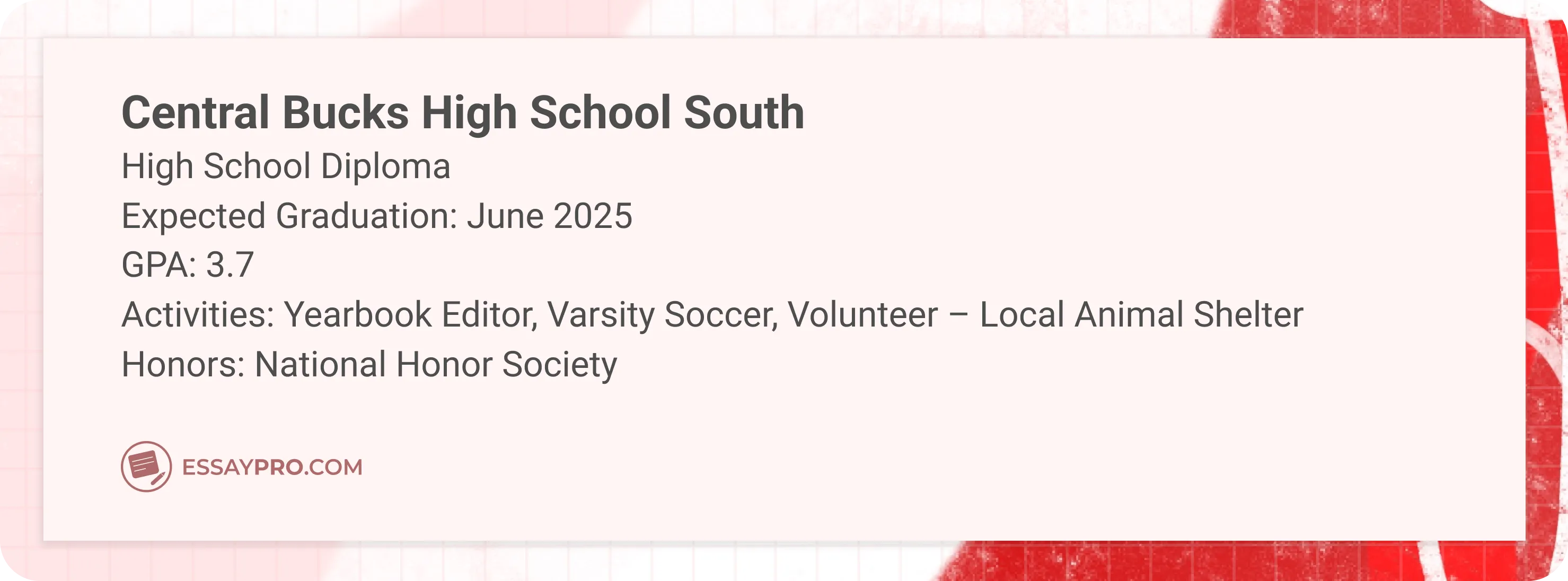
Need to introduce yourself at a college fair or interview? Learn how to write a speech about yourself from our recent article.
4. Examples for Vocational Training / Certifications
Your education section also includes a boot camp, trade program, professional certification, etc., not just a college degree.
Example 1: Bootcamp / Intensive Program
Focus on the program name, what it covered, and any final projects or skills.
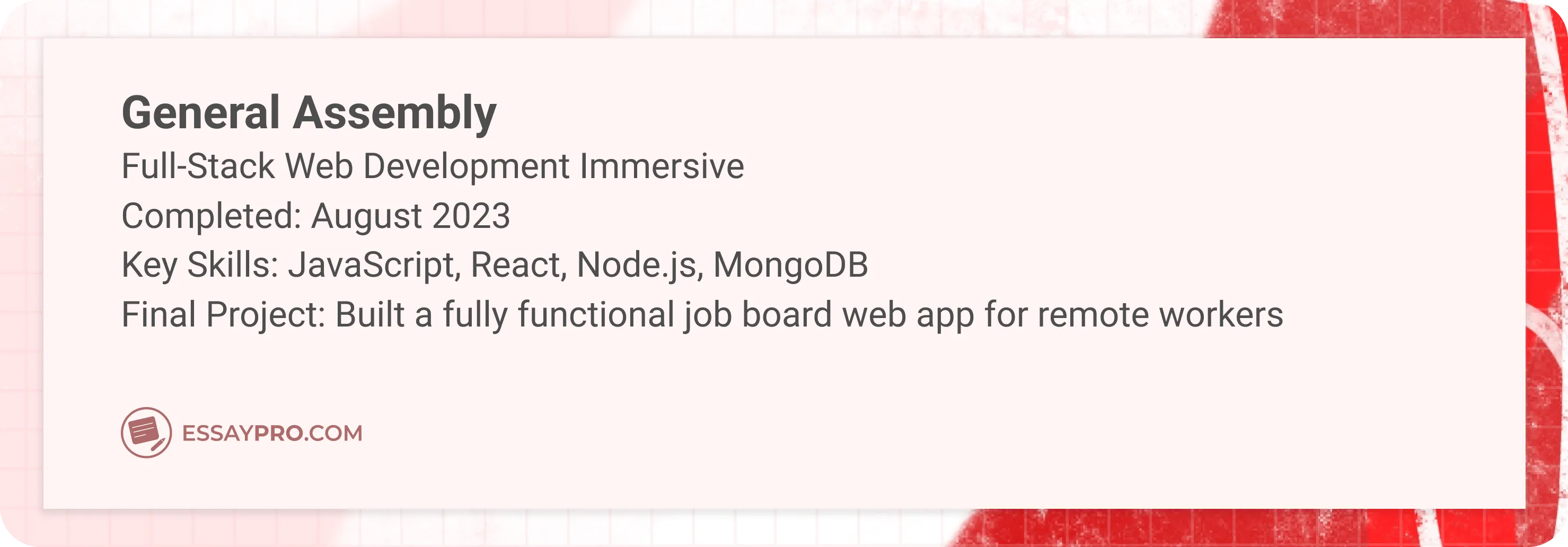
Example 2: Professional Certification
For official credentials or industry-standard certs, list the full title, certifying body, and completion date.
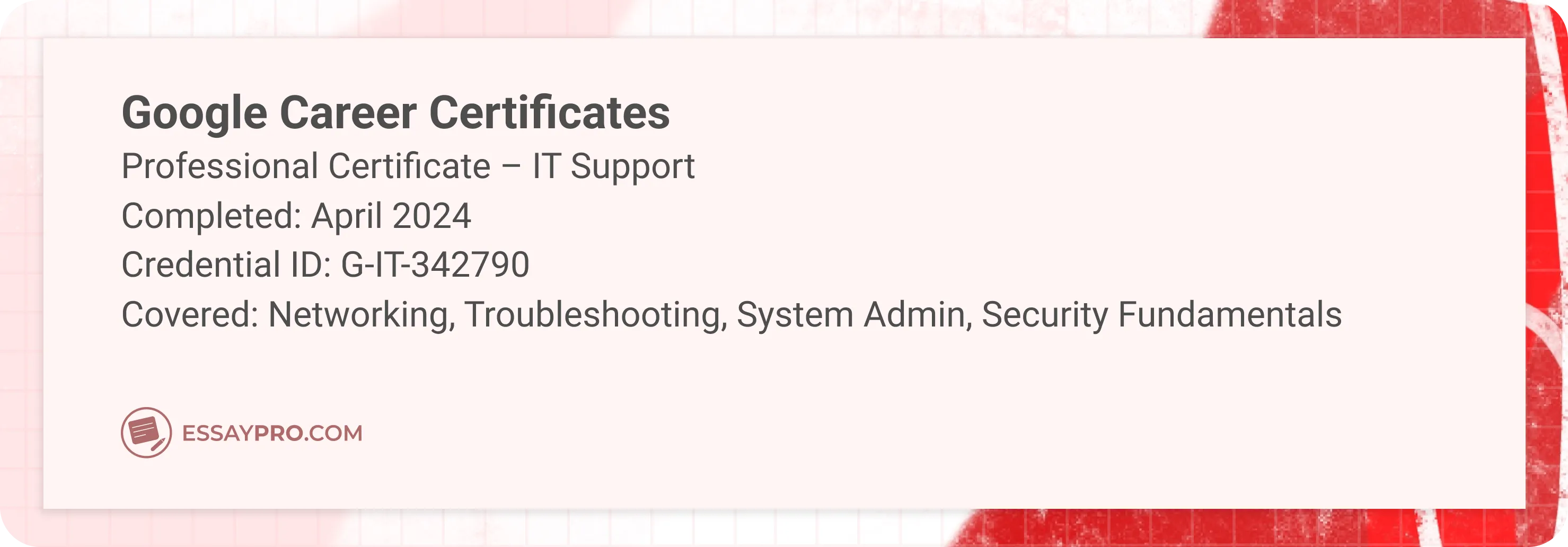
If you’re reviewing literature for class while updating your resume, here’s a quick Wuthering Heights summary that might save you time.
Final Thoughts
Before you leave, here’s what you need to remember when listing education on your resume: start with your most recent or current program; list degree, school name, graduation date (or expected one); mention GPA, coursework, and honors if they help; keep the section relevant and easy to skim.
And if you need help with anything academic, EssayPro’s professional paper writers are here to help.
One Step Closer To Graduation Starts Here
Get writing support that works for you, not a generic template.
FAQs
How Do You List Your Education on Your Resume?
Start with your most recent school. Add your degree, major, and graduation date.
What Do You Put for Level of Education?
Whatever fits, like 'Bachelor’s in Progress' or 'High School Graduate.' Just be specific.
Should Education Be First or Last?
If school is your biggest strength right now, put it near the top. If you’ve got solid work experience, it can go later.

Adam Jason
is an expert in nursing and healthcare, with a strong background in history, law, and literature. Holding advanced degrees in nursing and public health, his analytical approach and comprehensive knowledge help students navigate complex topics. On EssayPro blog, Adam provides insightful articles on everything from historical analysis to the intricacies of healthcare policies. In his downtime, he enjoys historical documentaries and volunteering at local clinics.
Walden University. (n.d.). Education section of the curriculum vitae. Walden University Career Services Center. https://academicguides.waldenu.edu/careerservices/cvguide/education
